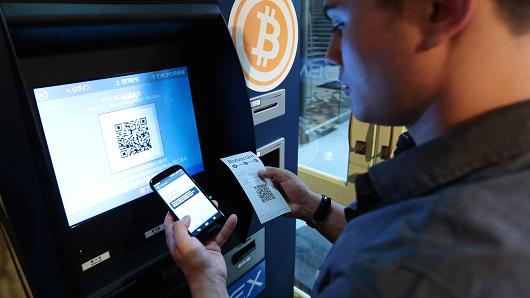BITCOIN IS THE NEW STOCK

To some market analysts, quiet, expensive stock markets are being overlooked by worrisome speculative activity in products such as bitcoin.
The price of the digital currency has surged since the end of last year, topping $3,000 earlier this month from $968 at the end of December, according to CoinDesk. Bitcoin traded around $2,750 on Friday.
A rival has soared even more. Ethereum, also known as ether, leaped more than 4,000 percent from around $7 last December to above $300 this month. The overall market value for cryptocurrencies has risen from below $20 billion at the start of this year to above $110 billion, according to CoinMarketCap.
As the stock market becomes increasingly expensive for ordinary investors — Apple and Facebook shares cost around $150 each — trading has heated up in bitcoin and other digital currencies. Bitcoin can be bought in fractions as low as one hundredth of a millionth, or about less than one-tenth of a cent at current prices. That makes it an easy target for speculation.
During the dot-com euphoria of the late 1990s, ordinary investors piled into shares of young, unproven technology companies and the day-trading taxi driver symbolized the era. But this time ordinary investors are going elsewhere, says Ian Winer, head of equities at Wedbush.
"They're not playing the stock market anymore. They're playing all the markets that are less regulated, and one of them is the cryptocurrency market," Winer said.
"Rather than your average guy or gal buying tech stocks, they're buying bitcoin or ether," he said. "I see speculation all over the place. I just don't see it in the stock market."
The average retail investor may not be reaping the benefits of bitcoin's gains, however. Analysis of bitcoin addresses — a combination of letters and numbers that identifies a bitcoin recipient — shows that the majority of transactions are done in fractions of bitcoin.
Just three addresses had balances of more than 100,000 bitcoins, or roughly $275 million, each, according to data from BitcoinPrivacy. In contrast, 16.8 million addresses had 0.00001 bitcoin, or about 3 cents, the data showed.
"Large amounts of bitcoin are heavily concentrated in the hands of a few people. People that get in now [can] only buy fractional pieces," said Alex Sunnarborg, research analyst at CoinDesk.
"I definitely think more and more retail investors have gone into it," he said. "There is definitely a lot of fear of missing out."
YOUNGER INVESTORS MORE LIKELY TO BUY BITCOINS RATHER THAN STOCK:-
Younger, tech-savvy people are also more likely to play the digital currency markets and the high risk involved, Sunnarborg said. He estimates that about two-thirds of investors in cryptocurrencies are under age 40.
That same age category is less likely to invest in the stock market. Just one-third of millennials, or adults currently aged 21 to 35, said they owned a stock in a Bankrate study last July. In contrast, 51 percent of Gen Xers, or those age 36 to 51, said they owned a stock, and 48 percent of baby boomers, ages 52 to 70, according to the survey of 1,000 American adults conducted for Bankrate by Princeton Survey Research Associates International.
"The next generation is suffering from the same thing that the Gen Xers suffered in the dot-com bust," Winer said. "They're playing all kind of markets that they know nothing about."
He was referring to the speculative trading that ended in the stock market's plunge in 2000.
Traders and market strategists also worry that a "fear of missing out trade" has helped send U.S. stocks deep into record territory — the S&P 500 has posted 24 record closes this year and is up 9 percent over that time.
The difference is this time, typical measures of overexuberance may not apply to stocks.
Bank of America Merrill Lynch's June global fund manager survey found that while a record 44 percent of managers say stocks are overvalued, their cash holdings have actually moved up to 5 percent, higher than the 10-year average of 4.5 percent. There's "no irrational exuberance" in contrast with the 1999 bubble, the note said.
However, sluggish global growth and easy central bank policy could limit investment returns, while people remain wary about stock markets after the financial crisis.
"I do believe that in a market with few attractive alternatives, speculation tends to become rampant," said Daniel Alpert, a founding managing partner at Westwood Capital. "And it almost doesn't matter what people choose to speculate in, as long as they believe there is a fool greater than they out there somewhere.
Source: CNBC